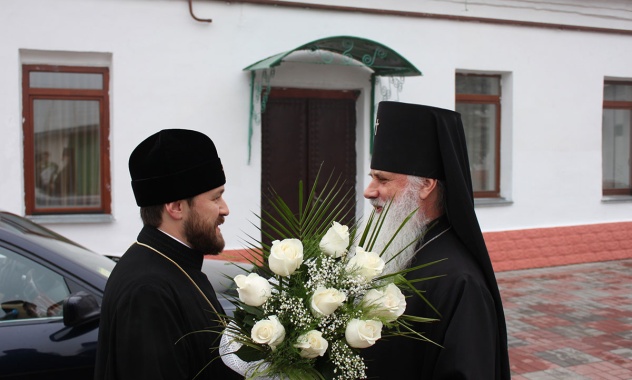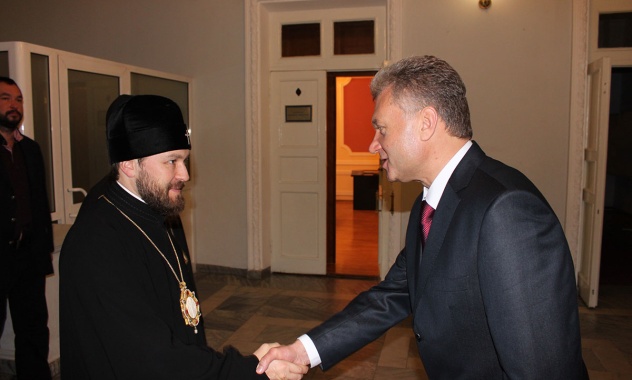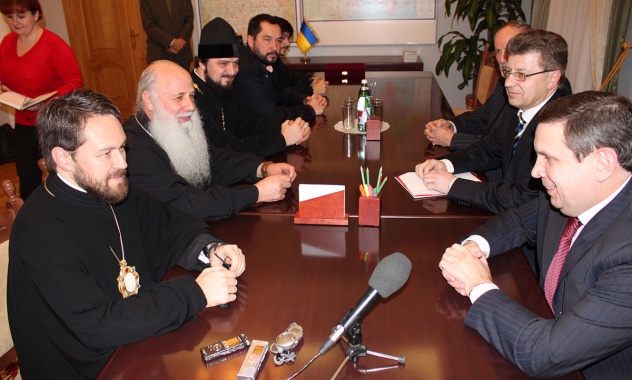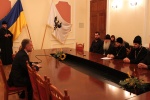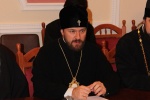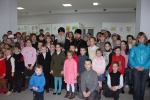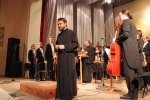Metropolitan Hilarion visits Chernigov
Metropolitan Hilarion of Volokolamsk, head of the Moscow Patriarchate’s department for external church relations, during his visit to Ukraine with the blessing of His Holiness Patriarch Kirill of Moscow and All Russia, visited Chernigov on 16 November 2010.
At the Monastery of the Trinity, in which the ruling bishop’s residence and the Chernigov Seminary are located, Metropolitan Hilarion and his party were welcomed by Archbishop Ambrose of Chernigov and Novgorod-Seversky.
Then the DECR chairman together with Archbishop Ambrose and the DECR staff members who accompanied Metropolitan Hilarion had a meeting with Chernigov Mayor A. Sokolov at the city council. Participating in the discussion was also Mr. V. Molochko, head of the city department for religious affairs. Mr. Sokolov noted that the city authorities maintained constructive relations with the Ukrainian Orthodox Church. Metropolitan Hilarion expressed hope that Chernigov, one of the oldest cities in Holy Rus’ which stands at a cross-roads between Ukraine, Russia and Belarus, would play an important role in strengthening cooperation between the three fraternal Slavic nations.
After this, Metropolitan Hilarion visited the Expocenter to award the winners of the regional children’s contest for the best drawing on the theme ‘Children to the Primate’ devoted to the 75th birthday of Metropolitan Vladimir of Kiev and All Ukraine.
In the evening of that day, the DECR chairman had a meeting with Regional Governor V. Khomenko. During their talk, Metropolitan Hilarion noted the importance of cooperation between the Church and secular authorities in the field of culture. He also stressed that the main task of his tour of Ukrainian cities was the preaching of the gospel’s values through music. He also told the governor that as Patriarch Kirill had recently appointed him rector of the church of Sts Michael and Theodore the Miracle-workers of Chernigov, he now felt special bonds with the city of Chernigov.
After that Metropolitan Hilarion came to the city Philharmonic Society to conduct an orchestra and a choir in performing his oratorio ‘Passions According to St. Matthews’. Present at the concert were local church leaders, numerous clergy and secular officials.
Speaking at the fraternal repast at the Monastery of the Trinity after the concert, Metropolitan Hilarion said:
‘Today our journey through Ukraine is coming to an end. It lasted only one week. But in these days we have met so many people and have seen so many cities and experienced so much that it will last us for a whole year and may be even many years.
I would like in the first lace to thank God for having given us an opportunity to experience these remarkable days which were darkened by nothing and which opened for us dear and beloved Ukraine. I would like to thank Ukraine, her people, hierarchs, clergy and laity, for having welcomed us in every place we visited. Our trip ended in the old beautiful city of Chernigov where the oldest churches in Holy Rus’ neighbour upon churches being built today by the Orthodox faithful.
In each city we have visited, my ‘Passions According to St. Matthews’ was performed. In this composition I wanted to tell listeners about Christ. It would seem that nothing new can be said about Him at a time when everyone can read the Gospel, unlike the situation thirty years ago. Nevertheless, we can see that the history of Jesus Christ, His suffering and death, is still little known by very many people. I will give you a simple example: while the Easter service in a particular church is normally attended by three thousand people, the service of Christ’s Passion on the Holy Friday is attended by only three hundred parishioners. If there are a thousand people attending Easter service, there are only one hundred believers attending the Passions of Christ. This shows that even those who are Orthodox Christians attend the service of Christ’s Passions very rarely. They make up only ten percent of those who come for Easter. It means that they miss this wonderful, moving and tragic story of the passions of Jesus Christ who was not just a man but also God who became man. And what can be said about those who do not come to church or come rarely? For them this history, though well-known, remains very distant.
In composing this music, I did not think at all about its missionary effect. I did not even think that it would be performed at all. I simply composed because the Lord gave me inspiration and I wanted to express all that I had experienced for many years when the Passion Week came and I was immersed in the liturgy of the Orthodox Church devoted to the Passions of Christ. But no words can expressed the feelings that overwhelm one when one thinks about the Passions of Christ, and the language of music helped me to express them.
When a composer writes his music he never knows how it will be received by listeners. Tchaikovsky himself conducted his great Symphony No. 6 when it was performed for the first time, and nobody understood that music, and he was hissed off. It was only after his death that people realized what he wanted to say in his symphony. When you compose music, you do not think whether people would understand it or not, for your soul is poured out in these sounds.
The human language cannot convey some feelings adequately, and the language of music makes up for this deficiency. To understand it, one does not have to study foreign languages or attend a conservatoire or a music school. If is sufficient to have a soul and heart open for taking in the word of God and profound and sincere human feelings. I can see again and again that the language of music gives people an opportunity to communicate at the depth where words are superfluous. And music is also an essential bearer of the message carried by the Church today.
I listened attentively to all that has been said here and I am very grateful to those who shared their impressions of today’s concert. I think you all have realized that it was not just a recital. It was in a sense a liturgy and participants in it were those who sang on the state and those who played musical instruments and those who sat in the hall. Each took in this wonderful story of Christ’s Passions in his or her own way.
This story unites all people because it has to do with the life of each. Each of us can find one own self in it. This story would have no special meaning if two thousand years ago in Jerusalem an ordinary man had not martyred and died on a cross. After all, there were a great many people in human history who were condemned unjustly and executed and betrayed by their own people. But there is only one person whose story remains absolutely special, absolutely unique. It was Jesus Christ. Why was His story so special? – Because He was God who became man.
When in our suffering and sorrows we lose strength and say: Where is God? Why does not He hear us, why does not He come to our help – we should first of all remember that God Himself was in the same situation. He Himself suffered like we suffer and even more. He endured outrage, humiliation and death. But all these suffering were the way to resurrection. And when we feel sorrow, when we are ageing and withering away, we realize that our life is none other than a movement towards death. And at the same time we realize that through death we move to resurrection, and just as Christ was raised from the dead, so will we. This is what I wanted to convey in my music.
Today several people told me about a pause that suddenly comes in the oratorio. Where does it come from and what for? Actually, it comes at the moment when the Gospel speaks about the death of Jesus Christ. All the previous movement of the music in this composition was a narration about the agony of Christ on the Cross. But when the Lord Jesus Christ dies, the history of His passions and death comes to an end, His life on the earth ends. What happens further on is something wonderful and mysterious: the Saviour descends into hell in order to enlighten all the dead with His light and then He rises from the death in order to raise from the dead the whole human race together with Him.
The moment of Christ’s death is not only a turning point in this modest oratorio but also a turning point in human history: Christ died so that we may not die, and He rose from the dead so that we may be raised from the dead. With His death a new history begins. It is not just a history of people’s suffering, their problems and earthly tribulations. It is a history of their reunion with God, their moving to life eternal. It begins from the silence which surrounded the Cross of Christ.
I thank all those who were present here and came to feel what I wanted to convey through these musical sounds. I would like to wish us all that Christ may be for us not just some abstract and distant person but that we may relate every day of our life to the life and teaching of Christ, that the Gospel may be for us not just a book to be taken occasionally from the shelf for reading a few pages but that we may live according to the Gospel so that the beatitudes we heard today may guide us in our life.
I would like to wish us all God’s help and to express hope that we will meet again to experience together what makes the core of human life, which is communion with God’.
DECR Communication Service
Other events
-
18.11.2010 11:51Metropolitan Hilarion completes his visit to Ukraine
-
17.11.2010 17:23(Russian) Архиереи Московского Патриархата из Белоруссии, России и Украины совершили молебен на границе трех восточно-славянских государств
-
17.11.2010 04:12Metropolitan Hilarion visits Chernigov
-
16.11.2010 14:49Metropolitan Hilarion of Volokolamsk meets with His Beatitude Metropolitan Vladimir of Kiev and All Ukraine
-
14.11.2010 21:58Metropolitan Hilarion visits Poltava diocese
-
13.11.2010 20:49Metropolitan Hilarion officiates at All-Night Vigil at the Cathedral of Annunciation in Kharkov
-
13.11.2010 18:31Metropolitan Hilarion meets with leadership of the Kharkov region
-
13.11.2010 15:13Metropolitan Hilarion begins his visit to Kharkov
-
12.11.2010 18:58(Russian) Завершился визит митрополита Илариона в Луганскую епархию
-
12.11.2010 18:35(Russian) Митрополит Волоколамский Иларион дал интервью луганскому телеканалу «ЛОТ»
-
12.11.2010 17:54(Russian) Председатель ОВЦС встретился с новым главой Луганской областной администрации
-
12.11.2010 15:47(Russian) Митрополит Иларион встретился с городским головой Луганска
-
12.11.2010 01:59(Russian) Митрополит Иларион посетил Северодонецкую епархию
-
11.11.2010 22:22(Russian) Митрополит Иларион посетил Успенскую Святогорскую Лавру
-
11.11.2010 10:58Ukrainian President’s wife listens to Metropolitan Hilarion’s Oratorio in Donetsk
-
11.11.2010 10:34Metropolitan Hilarion meets with workers of culture and art in Donetsk
-
11.11.2010 10:30(Russian) Митрополит Иларион: Корни культуры уходят в религиозный опыт человечества
-
10.11.2010 14:58Metropolitan Hilarion begins his visit to Ukraine







